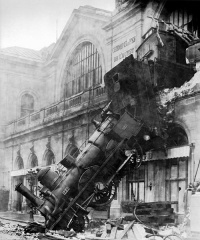Invention
From The Art and Popular Culture Encyclopedia

|
"The work of Alexius Pedemontanus De Secretis is no contemptible source from which materials may be drawn for the technological History of Inventions; and on this account it will perhaps afford pleasure to many if I here give an account of the author, according to such information as I have been able to obtain."--A History of Inventions, Discoveries, and Origins (1797) by Johann Beckmann "It was an essential feature of the European Renaissance to praise recent discoveries and achievements as a means to assert the independence of modern culture from the institutions and wisdom inherited from Classical (Greek and Roman) authorities. From the first years of the sixteenth century, a key conceit used to this end by the most eminent humanists (François Rabelais, Gerolamo Cardano, Jean Bodin, Tommaso Campanella, Francis Bacon, etc.) was that of the "Three Greatest Inventions of Modern Times" — the printing press, firearms, and the nautical compass — which together allowed the Moderns to communicate, exert power, and travel at distances never imagined by the Ancients. When the quarrel of the Ancients and the Moderns later arose in France, this conceit of "Three Greatest Inventions of Modern Times" would almost invariably be adduced as evidence of the Moderns' superiority."--Sholem Stein |

Illustration: Train wreck at Montparnasse (October 22, 1895) by Studio Lévy and Sons
|
Related e |
|
Featured: |
An invention is a new composition, device, or process. An invention may be derived from a pre-existing model or idea, or it could be independently conceived in which case it may be a radical breakthrough. In addition, there is cultural invention, which is an innovative set of useful social behaviors adopted by people and passed on to others. Inventions often extend the boundaries of human knowledge or experience. An invention that is novel and not obvious to others skilled in the same field may be able to obtain the legal protection of a patent.
Downside of inventions
As Paul Virilio has noted, every new invention has a downside which we are unwilling to acknowledge in the name of progress: the invention of automobiles inaugurated car-crashes; the invention of nuclear energy, Hiroshima and Tchernobyl. The technologies of instant communications have invented pure war.
See also
- Creativity
- Creativity techniques
- Diffusion of innovations
- Discovery
- List of inventors killed by their own inventions
- Mad scientist
- Mind's eye
- Multiple discovery
- Technology
- The heroic theory of invention and scientific development
- Timeline of historic inventions, for a detailed list of inventions, listed by date of invention

